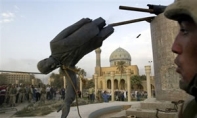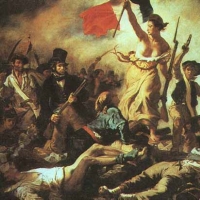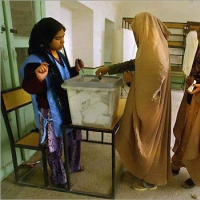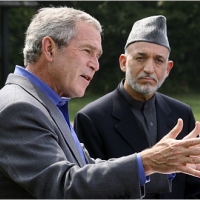- About Us
- Columns
- Letters
- Cartoons
- The Udder Limits
- Archives
- Ezy Reading Archive
- 2024 Cud Archives
- 2023 Cud Archives
- 2022 Cud Archives
- 2021 Cud Archives
- 2020 Cud Archives
- 2015-2019
- 2010-2014
- 2004-2009
 |
Perceptions Of Democracy In The Modern World |
Since 1789 democracy has appeared as a form of government in many nations. Democracy has had its own successes and failures, but at the end of the twentieth century it appears to  be the most successfully implemented government system particularly after the recent collapse of the Soviet Union. The global presence of democracy has not been uniform by any means, however, and democracy in one country will not necessarily be similar to the democracy of another.1 Differing perceptions of a political system may determine its success or failure and will also determine how a system will operate after its establishment. Three such factors that have had an impact upon perceptions of democracy in the modern world include historical experience, the persistence of democratic myths, and the issue of culture. All three are very closely linked.
be the most successfully implemented government system particularly after the recent collapse of the Soviet Union. The global presence of democracy has not been uniform by any means, however, and democracy in one country will not necessarily be similar to the democracy of another.1 Differing perceptions of a political system may determine its success or failure and will also determine how a system will operate after its establishment. Three such factors that have had an impact upon perceptions of democracy in the modern world include historical experience, the persistence of democratic myths, and the issue of culture. All three are very closely linked.
The historical experience of democracy has generally been that it has succeeded only when a particular set of circumstances or pre-conditions exist in a country that will make the development of democracy viable. Ralf Dahrendorf theorizes that there are roughly four elements required for effective liberal democracy, revolving around the concepts of equality, conflict recognition and resolution, elite diversity, and public virtues.2 These factors must exist for democracy, but more importantly they must also exist for the people in these countries to perceive democracy as the best and most desirable form of government for them.3
Historically, as supported by John Dunn, over the last two centuries constitutional representative democracy has been remarkably successful in several countries (for instance the United States), but "in many others, especially the poorer ex-colonies of Europe since 1945, its fate has been brief and inglorious."4 In revolutionary France Alexis De Tocqueville attempted to discover why democracy had failed, much later in 1960's South Vietnam another democratic experiment sponsored by the United States failed, since 1989 the new democracies of Eastern and Central Europe have struggled at various times to succeed with a new system of government, and Iraq and Afghanistan are also currently facing their own challenges in this respect. These few examples of democratic instability can suggest to us that when certain elements such as inequality, cultural conflict, political and economic instability and social upheaval are present that democracy will not always succeed. This has been the historical experience, and people's perceptions of historical experience will affect the course of democratic application and direction in the future.5
but "in many others, especially the poorer ex-colonies of Europe since 1945, its fate has been brief and inglorious."4 In revolutionary France Alexis De Tocqueville attempted to discover why democracy had failed, much later in 1960's South Vietnam another democratic experiment sponsored by the United States failed, since 1989 the new democracies of Eastern and Central Europe have struggled at various times to succeed with a new system of government, and Iraq and Afghanistan are also currently facing their own challenges in this respect. These few examples of democratic instability can suggest to us that when certain elements such as inequality, cultural conflict, political and economic instability and social upheaval are present that democracy will not always succeed. This has been the historical experience, and people's perceptions of historical experience will affect the course of democratic application and direction in the future.5
Culture is of considerable significance in affecting perceptions of democracy. The traditions, practices and beliefs of a particular country will mean that the population will have a common way of viewing a set of external circumstances or ideas, and depending upon the adaptability of that culture, may be able to adopt, absorb, or may reject that externality.6 In the United States popular and political culture has contributed towards a quite mythical perception of democracy. In contrast, in South Vietnam in the 1960's the U.S failed to take account for Vietnam's cultural and social history and non-democratic tradition. Culture, therefore made democracy unsuccessful as people's perceptions and traditions  (combined with the absence of the foundations for democracy) rejected the system. This cultural and social element remains a very significant threat to new democracies in the Middle East today.
(combined with the absence of the foundations for democracy) rejected the system. This cultural and social element remains a very significant threat to new democracies in the Middle East today.
Perhaps one of the most relevant examples of how culture can influence perceptions of democracy has been in Singapore under the rule (and now ongoing influence) of Minister Lee Kuan Yew. Lee accepts that his nation's democratic system has flowed from the West, but he views the Western — and most specifically the American democracies — as inferior to those in Asia primarily because they lack the cultural traditions of Asia. Lee identifies a "breakdown of civil society" within the United States in areas such as crime, class inequality and in an overall absence of order. It is Lee's belief that too much freedom has been given to individuals.7 Lee sees that Asian values and beliefs, deeply rooted within the culture and traditions of Asia need to be adopted as a solution for such problems, with emphasis upon morality, the family unit and education, and less emphasis upon the all-powerful good government responsible for everything.8 Lee has commented that, "If you have a culture that doesn't place much value in learning and scholarship and hard work and thrift and deferment of present enjoyment for future gain, the going will be much slower."9 Additionally Lee sees that Asian culture, when combined with the lessons learnt from the destructive wars of the West, is able to make its democratic systems essentially superior despite their comparative youth and criticism as being "end-product" democracies.10 Clearly Lee's viewpoint (criticized as it is) represents a strong case of how culture has influenced perceptions of democracy.11
Myth, important because of the way in which it is capable of capturing the minds and imaginations of people and carrying the democratic system to further levels of development, is significant in influencing modern perceptions of democracy. Myths are best understood in the context of their political and popular cultures and sub-cultures within which they exist. Far from making a mockery of democracy, myths have, particularly since 1945 (especially in the United States), contributed towards launching a legitimization of democracy and uses of power. Myths have given democracy a reputation of success.12 Democratic myths, even when challenged, have continued to survive and even grow, further changing our perceptions of democracy.
to further levels of development, is significant in influencing modern perceptions of democracy. Myths are best understood in the context of their political and popular cultures and sub-cultures within which they exist. Far from making a mockery of democracy, myths have, particularly since 1945 (especially in the United States), contributed towards launching a legitimization of democracy and uses of power. Myths have given democracy a reputation of success.12 Democratic myths, even when challenged, have continued to survive and even grow, further changing our perceptions of democracy.
As a result of the political culture and ideology of post-World War Two America that demanded a legitimization and satisfactory justification for the costs and undertakings of the Cold War, the myths of democratic greatness have been inflated substantially. The democratic myths of post-war America tell us that liberal democracy is equated with anti-communism and anti-terrorism, that liberal democracy guarantees equality and full freedoms (even though this can never be completely possible under capitalism), and to an extent these myths also tell us that Western democracies will only be able to succeed because they are a part of the extremely loose and vague concept of a "Western tradition".
Other democratic myths include those surrounding the French Revolution and the famous storming of the Bastille that did not result in a successful democracy but a republic. This was despite the seemingly democratic ideals of the revolutionaries that were founded on liberty, equality and fraternity (a result which De Tocqueville consequently attempted to comprehend in his comparative analysis of the French and American experiences).13 Another famous democratic myth was that of equality for all in the classic democracy of ancient Athens, a  situation that did not exist as women and slaves did not share the same rights as citizen males. The 1989 fall of the Berlin Wall added to the democratic myth as many associated the fall of communist Germany with the triumph of democratic ideals, morality and progress, even as many of the "liberated" masses had no idea what democracy actually was or entailed, and even as some suggest that the fall of the Berlin Wall actually had more to do with the decisions made by the Moscow administration as opposed to the activities of any democratic revolutionaries.
situation that did not exist as women and slaves did not share the same rights as citizen males. The 1989 fall of the Berlin Wall added to the democratic myth as many associated the fall of communist Germany with the triumph of democratic ideals, morality and progress, even as many of the "liberated" masses had no idea what democracy actually was or entailed, and even as some suggest that the fall of the Berlin Wall actually had more to do with the decisions made by the Moscow administration as opposed to the activities of any democratic revolutionaries.
The sum result of these democratic myths has been that people in the modern world have at times accepted democracy without question as the only legitimate and most superior system of government in existence. This has been dangerous in imposing democratic regimes upon some nations who have neither the democratic tradition nor the mechanics required for successful democracy. Already some authors fear of the development of an American "democratic imperialism" which they argue has been growing through the power and access awarded by the believers of the myths of democracy upon the United States within the last fifty years.14Once again, Iraq and Afghanistan stand out as the most obvious current ‘test cases’ for new democratic governments being implemented in somewhat un-chartered waters for such systems.
Many factors have thus influenced how democracy has been perceived in the modern world. Historically democracy has been successful only when specific sets of circumstances are present.  Culture can affect the success, failure or the development of democracy into new forms, and myth, particularly when democracy has a combination of appeal and viability may be instrumental in affecting our perceptions of the democratic system.14What is clear from this analysis is that it would be dangerous to generalize about democracy and democratic systems, as no two have been exactly alike at any point in history.16Perhaps this is why some consider the current period an "age of confusion" because no single meaning can be ascribed to democracy as intervening factors such as historical experience, culture and myth affect people's perceptions that will then mold very diverse and varied systems of democratic government. Whilst the term "democracy" may be shared by many nations to describe their political institutions, innumerable factors can and will alter their content and character.
Culture can affect the success, failure or the development of democracy into new forms, and myth, particularly when democracy has a combination of appeal and viability may be instrumental in affecting our perceptions of the democratic system.14What is clear from this analysis is that it would be dangerous to generalize about democracy and democratic systems, as no two have been exactly alike at any point in history.16Perhaps this is why some consider the current period an "age of confusion" because no single meaning can be ascribed to democracy as intervening factors such as historical experience, culture and myth affect people's perceptions that will then mold very diverse and varied systems of democratic government. Whilst the term "democracy" may be shared by many nations to describe their political institutions, innumerable factors can and will alter their content and character.
BIBLIOGRAPHY:
Ralf Dahrendorf, Society and Democracy In Germany, Weidenfeld and Nicolson Ltd., 1979.John Dunn (ed.), Democracy, The Unfinished Journey — 508 B.C to A.D 1993.
Kim Dae Jung, "A Response to Lee Kuan Yew, Is Culture Destiny", Foreign Affairs, Vol. 73, No.6, November/December 1994.
C.B Macpherson. The Life and Times of Liberal Democracy, OUP, 1977.
Alexis De Tocqueville, Democracy in America, Harper and Row, Publishers, 1988.
William Appleman Williams, The Tragedy of American Diplomacy, Delta Books, 1959.
Fareed Zakaria, "Culture is Destiny A Conversation With Lee Kuan Yew", Foreign Affairs, Vol.73, No.2, November/December 1994.
Endnotes
- Macpherson, C.B, The Life and Times of Liberal Democracy, OUP, 1977, p.7
- Dahrendorf, Ralf. Society and Democracy In Germany, Weidenfeld and Nicolson Ltd., pp.29-31.
- Dahrendorf gives the example that democracy would be unlikely to succeed in the Congo where the cultural traditions, public perceptions, and infrastructure required for democracy would be absent. Ibid., pp.27-28.
- Dunn, John (ed.). Democracy, The Unfinished Journey — 508 B.C to A.D 1993, OUP, 1993, pp.254-255.
- Ibid., p.255.
- Ibid., pp.146-147.
- Fareed Zakaria, "Culture is Destiny A Conversation With Lee Kuan Yew", Foreign Affairs, Vol.73, No.2, November/December 1994, pp.111-112.
- Ibid., pp.113-114.
- Ibid., pp.116-117.
- Ibid., p.121.
- For a culture-based response to Lee see Kim Dae Jung, "A Response to Lee Kuan Yew, Is Culture Destiny", Foreign Affairs, Vol. 73, No.6, November/December 1994, pp.189-194.
- Dunn, op.cit., p.247.
- Tocqueville, Alexis de. Democracy in America, Harper and Row, Publishers.
- William Appleman Williams, The Tragedy of American Diplomacy,, Delta Books, 1959, p.15.
- Dunn, op.cit., p.252.
- Macpherson, op.cit., p.7.
